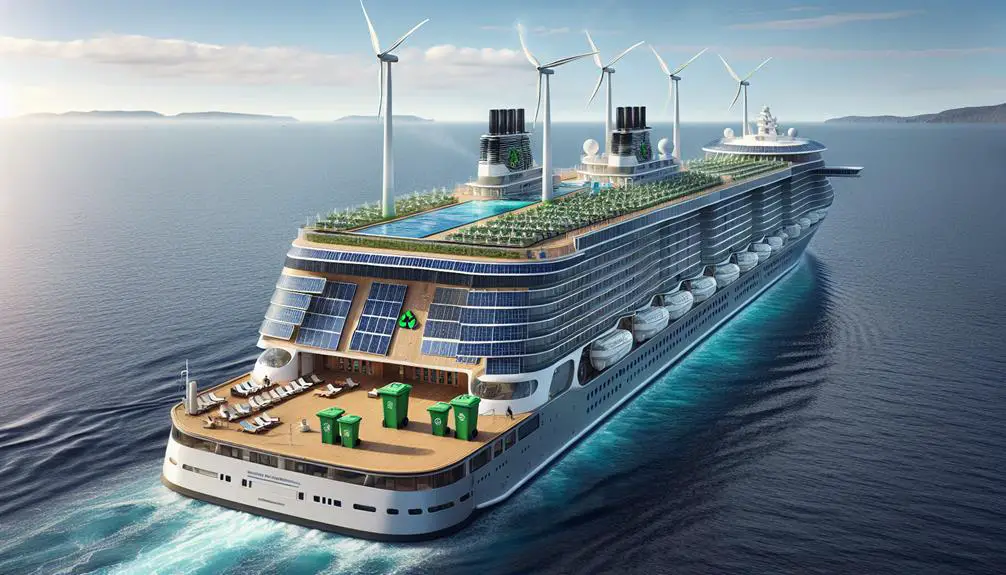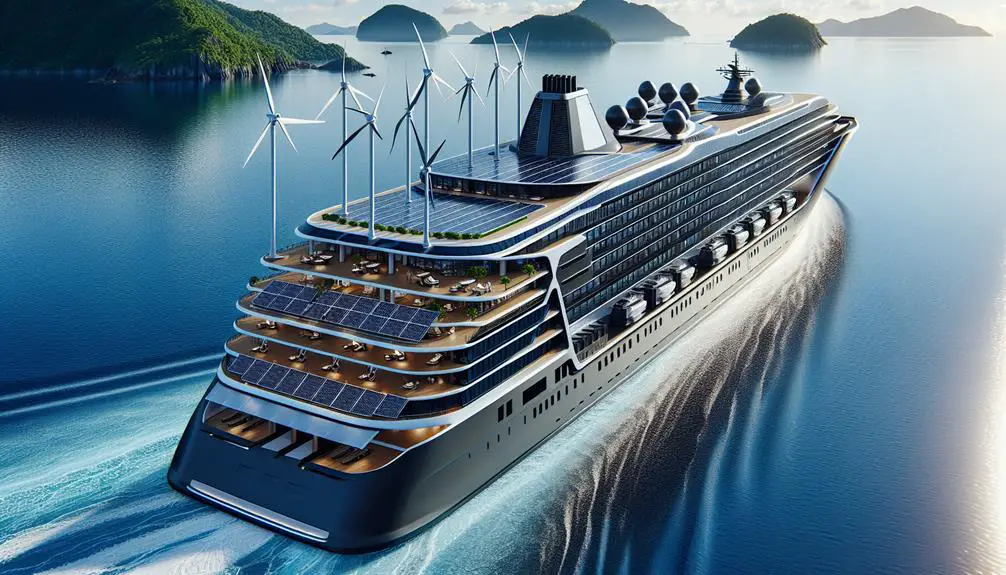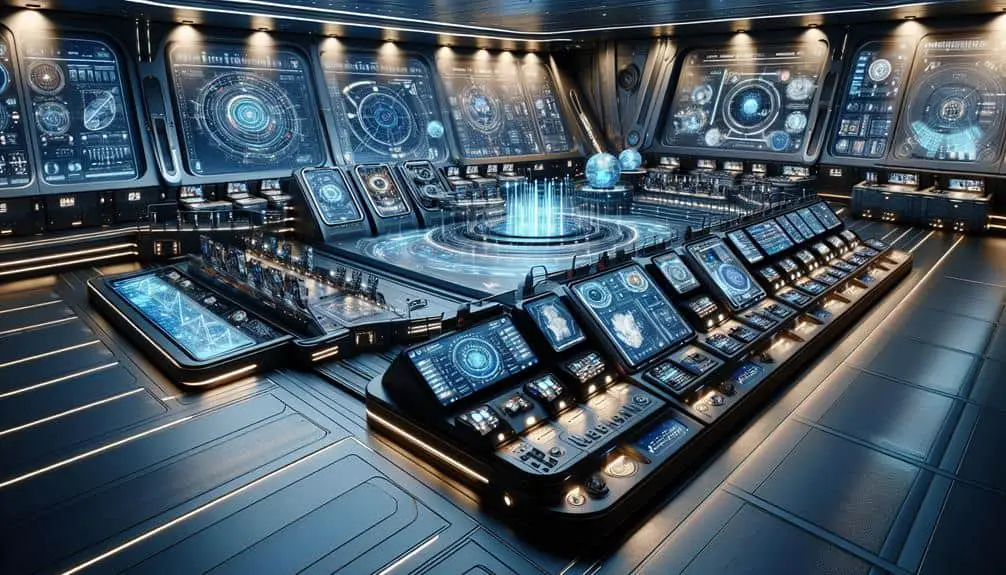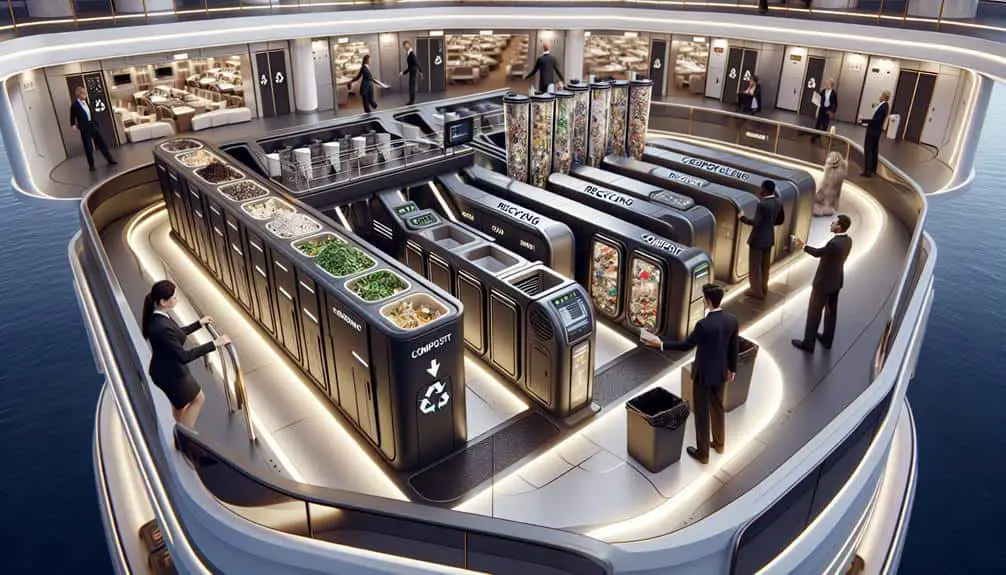Experience the cutting-edge wave of sustainable practices in cruising with solar power and wind turbines leading the charge. Innovative waste management tactics and recycling technologies are transforming onboard operations. Emission reduction strategies like exhaust gas cleaning systems and alternative fuels prioritize environmental health. Eco-friendly ship designs utilize state-of-the-art materials and energy-efficient systems for a greener maritime industry. By implementing green propulsion systems and carbon footprint tracking, cruising is shaping a sustainable future at sea. Uncover how these initiatives are revolutionizing the industry for a more environmentally friendly voyage.
Key Points
- Implementation of green propulsion systems like LNG engines and hybrid solutions.
- Tracking carbon footprint for monitoring and minimizing environmental impact.
- Data-driven approach for informed decisions on sustainability.
- Cost-effective green technologies as alternatives to traditional methods.
- Shaping the future of cruising towards sustainability with green technology initiatives.
Sustainable Energy Solutions
Explore how sustainable energy solutions are revolutionizing the cruising industry, reducing emissions, and promoting eco-friendly practices. Solar power and wind turbines stand at the forefront of this transformation. Solar power, harnessed through photovoltaic panels installed on cruise ships, captures sunlight and converts it into electricity. This enables ships to reduce their reliance on traditional fossil fuels, thereby decreasing greenhouse gas emissions to a large extent.
Additionally, wind turbines, strategically positioned on cruise vessels, harness wind energy to generate power. By utilizing these renewable energy sources, cruise companies aren't only reducing their environmental impact but also cutting operational costs in the long run.
The integration of solar power and wind turbines in cruising represents a paradigm shift towards sustainability. Data shows that cruise ships equipped with these technologies have reported substantial reductions in carbon emissions, thereby contributing to a cleaner maritime industry. Embracing these innovative solutions not only aligns with eco-conscious initiatives but also sets a new standard for energy-efficient practices within the cruising sector.
Waste Management Innovations
Revolutionizing waste management practices in the cruising industry, innovative solutions are being implemented to minimize environmental impact and enhance sustainability. Recycling innovations play a significant role in reducing the amount of waste generated onboard. Advanced sorting systems are being employed to make sure that materials such as paper, plastic, glass, and metal are properly recycled. Composting methods are also being utilized to manage organic waste efficiently. By composting food scraps and other biodegradable materials, cruise ships can reduce the volume of waste sent to landfills.
Moreover, waste to energy solutions are gaining traction in the industry. Technologies that convert waste into energy are being adopted to minimize the environmental footprint of cruises. These solutions not only help in waste reduction but also contribute to energy production onboard. Additionally, plastic reduction efforts are being prioritized to curb the use of single-use plastics. Cruise lines are implementing policies to limit plastic usage and promote alternatives such as biodegradable or reusable materials. These initiatives collectively contribute to a more sustainable waste management system in the cruising sector.
Emission Reduction Strategies
With a focus on sustainable practices, the cruising industry is implementing cutting-edge emission reduction strategies to minimize its environmental impact. To address the issue of carbon footprint, cruise lines are increasingly turning to advanced technologies such as exhaust gas cleaning systems, also known as scrubbers. These systems help reduce sulfur emissions from ships, thereby decreasing their overall carbon footprint. Additionally, the industry is investing in alternative fuels like liquefied natural gas (LNG) and shore power connections to further lower emissions.
Improving air quality is another vital focus area for cruise lines. By utilizing shore power when docked, vessels can significantly decrease their emissions while in port, positively impacting the air quality of coastal areas. Additionally, ongoing research and development into hybrid propulsion systems and fuel cell technology are promising steps towards achieving even cleaner operations at sea. These innovative approaches highlight the industry's commitment to sustainability and responsible environmental stewardship.
Eco-Friendly Ship Designs
Incorporating state-of-the-art materials and energy-efficient systems, modern eco-friendly ship designs are revolutionizing the maritime industry's approach to sustainability. Green materials, such as recycled steel and aluminum, are being used extensively in shipbuilding to reduce environmental impact. These materials not only lower the carbon footprint during production but also enhance the ship's efficiency during its operational life.
One of the key focuses in eco-friendly ship designs is energy efficiency. Ships are now being equipped with advanced propulsion systems, such as LNG-powered engines and hybrid technologies, to minimize fuel consumption and emissions. Additionally, innovative hull designs and coatings are being implemented to reduce drag and improve fuel efficiency.
Furthermore, energy-saving technologies like LED lighting, smart heating, ventilation, and air conditioning (HVAC) systems, and waste heat recovery systems are being integrated into modern ship designs. These initiatives not only decrease energy consumption but also contribute to lower operating costs in the long run. By embracing green materials and energy-efficient systems, eco-friendly ship designs are paving the way for a more sustainable future in the cruising industry.
Green Technology Implementation
To drive sustainable practices forward, the implementation of green technology is paramount in shaping the future of cruising. Green propulsion systems, such as LNG engines and hybrid solutions, are revolutionizing the industry by greatly reducing emissions and enhancing fuel efficiency. These innovative systems not only decrease environmental impact but also provide a more efficient and cost-effective alternative to traditional propulsion methods.
In addition to advanced propulsion technologies, carbon footprint tracking plays an essential role in monitoring and minimizing the environmental impact of cruise ships. By utilizing sophisticated tracking systems, cruise lines can analyze their emissions data in real-time, identify areas for improvement, and implement strategies to reduce their carbon footprint effectively. This data-driven approach enables companies to make informed decisions that prioritize sustainability while maintaining operational excellence.
Frequently Asked Questions
How Do Cruise Ships Minimize Their Environmental Impact When It Comes to Wildlife Protection and Conservation Efforts?
To protect wildlife and promote environmental stewardship, cruise ships utilize advanced technologies like sonar systems to detect marine life, implement speed restrictions in sensitive areas, and educate passengers on conservation efforts. This proactive approach guarantees sustainable cruising practices.
Are There Any Initiatives in Place to Reduce the Use of Single-Use Plastics on Cruise Ships?
To reduce single-use plastics on cruise ships, initiatives focus on innovative solutions like biodegradable alternatives and onboard recycling programs. Energy efficiency measures, such as optimizing propulsion systems and using LED lighting, also help in reducing emissions.
What Measures Are Being Taken to Increase the Sustainability of Food Sourcing and Reduce Food Waste on Cruise Ships?
Boost energy efficiency and cut waste on cruise ships with farm-to-table sourcing and advanced composting. Dive deep into sustainable food practices with innovative techniques. Mastering food waste reduction is key to cruising sustainability.
How Are Cruise Lines Working to Educate Passengers and Crew Members About Sustainable Practices While on Board?
On board, cruise lines educate you on sustainable practices through waste management and recycling programs. They emphasize energy efficiency to reduce the carbon footprint. Stay informed and contribute to a greener cruising experience.
Are There Any Partnerships or Collaborations With Local Communities or Organizations to Support Environmental Conservation Efforts in the Areas Where Cruise Ships Dock?
In supporting environmental conservation efforts, cruise lines often form community partnerships. By collaborating with local organizations, they enhance conservation impact in areas where ships dock. Such initiatives foster sustainable practices and educate passengers on environmental stewardship.




